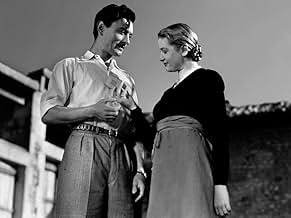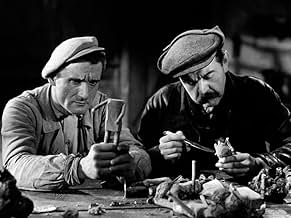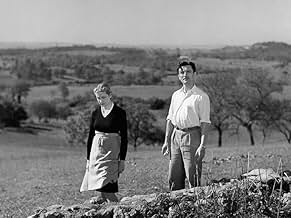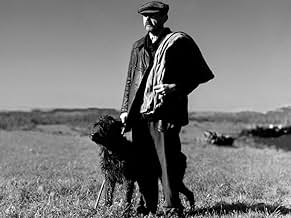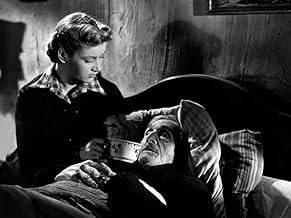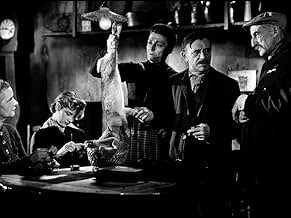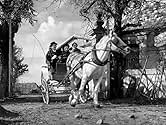IMDb RATING
7.5/10
1.1K
YOUR RATING
In a lost French village, an old woman is killed and her savings stolen. Several members of her family, all called "Goupi", are suspected.In a lost French village, an old woman is killed and her savings stolen. Several members of her family, all called "Goupi", are suspected.In a lost French village, an old woman is killed and her savings stolen. Several members of her family, all called "Goupi", are suspected.
- Awards
- 1 win total
Albert Rémy
- Jean des Goupi
- (as Rémy)
Georges-François Frontec
- Bit Part
- (uncredited)
Maurice Marceau
- Un porteur à la gare
- (uncredited)
- Director
- Writers
- All cast & crew
- Production, box office & more at IMDbPro
Storyline
Did you know
- TriviaAward: Grand Prix du Cinéma Français 1943.
- ConnectionsFeatured in My Journey Through French Cinema (2016)
Featured review
This is actually a very subversive film, given the circumstances and the date (1943) at which it was made. It is set in the Charente, which is a region a little to the east of La Rochelle, and not too far from the cities of Limoges and Poitiers. As such it was close (if not on) the border between the zone of (German) occupation and Vichy France. Although this film consists mostly of interiors there are enough outdoor scenes (all shot in what looks like late autumn or early winter) to give a real feel for the countryside.
Vichy (which had a reduced jurisdiction over occupied France) sunk a very large amount of political capital into the promotion of a 'certain idea of France' - that's De Gaulle's phrase, however, not Petain's). That 'idea' was of a rejuvenated nation, that case aside the infamous corruption of the Third Republic, and which gave pride of place to morality, (Roman Catholic) religion and country - specifically the countryside, rather than the cities (which were nests of subversives and Semites, so-called). It was a form of the 'integral nationalism' promoted by Charles Maurras, but with Petain as a substitute monarch.
However, here is a film which deliberately sets the city (in the person of the naive store clerk, Eugene, played by the young Georges Rollin) against his rather wicked rural relatives, complete with a tipsy, centenarian patriarch (Maurice Schultz). It turns into a rather interesting detective story, but one with a very literary style.
I imagine that it slipped through the censor's scissors only because of the portrayal of the Parisian Eugene as witless and rather feckless - almost a pawn in the hands of his unscrupulous uncles and cousins. Yet the film is much more savage towards the peasants, who are really a gallery of grotesques. They are superstitious, opportunistic, entirely selfish, idle and grasping - it is almost like one of Guy de Maupassant's caricatures of the narrow-minded and bigoted Norman farmers and petit-bourgeois. So the enormous propaganda push by Vichy to elevate 'la France profonde' to mystical status is here either ridiculed or simply disregarded. This is really a film about characterisation rather than plot, and the cast (led by the excellent Fernand Ledoux) are first rate.
It is a pity that Jacques Becker was not able to keep up the good work in the postwar years - films like "Ali Baba" (with Fernandel), "Montparnasse 19" and "Arsene Lupin" for the most part didn't measure up to "Goupi Mains Rouges" or "Casque d'Or". Perhaps it is true that the restraints of a repressive culture and regime do make for a better and more subtle product.
Vichy (which had a reduced jurisdiction over occupied France) sunk a very large amount of political capital into the promotion of a 'certain idea of France' - that's De Gaulle's phrase, however, not Petain's). That 'idea' was of a rejuvenated nation, that case aside the infamous corruption of the Third Republic, and which gave pride of place to morality, (Roman Catholic) religion and country - specifically the countryside, rather than the cities (which were nests of subversives and Semites, so-called). It was a form of the 'integral nationalism' promoted by Charles Maurras, but with Petain as a substitute monarch.
However, here is a film which deliberately sets the city (in the person of the naive store clerk, Eugene, played by the young Georges Rollin) against his rather wicked rural relatives, complete with a tipsy, centenarian patriarch (Maurice Schultz). It turns into a rather interesting detective story, but one with a very literary style.
I imagine that it slipped through the censor's scissors only because of the portrayal of the Parisian Eugene as witless and rather feckless - almost a pawn in the hands of his unscrupulous uncles and cousins. Yet the film is much more savage towards the peasants, who are really a gallery of grotesques. They are superstitious, opportunistic, entirely selfish, idle and grasping - it is almost like one of Guy de Maupassant's caricatures of the narrow-minded and bigoted Norman farmers and petit-bourgeois. So the enormous propaganda push by Vichy to elevate 'la France profonde' to mystical status is here either ridiculed or simply disregarded. This is really a film about characterisation rather than plot, and the cast (led by the excellent Fernand Ledoux) are first rate.
It is a pity that Jacques Becker was not able to keep up the good work in the postwar years - films like "Ali Baba" (with Fernandel), "Montparnasse 19" and "Arsene Lupin" for the most part didn't measure up to "Goupi Mains Rouges" or "Casque d'Or". Perhaps it is true that the restraints of a repressive culture and regime do make for a better and more subtle product.
- dreverativy
- Dec 29, 2006
- Permalink
- How long is It Happened at the Inn?Powered by Alexa
Details
- Release date
- Country of origin
- Language
- Also known as
- Dogodilo se u krčmi
- Filming locations
- Charente, France(Exterior)
- Production company
- See more company credits at IMDbPro
- Runtime1 hour 36 minutes
- Color
- Aspect ratio
- 1.37 : 1
Contribute to this page
Suggest an edit or add missing content

Top Gap
By what name was It Happened at the Inn (1943) officially released in Canada in English?
Answer
